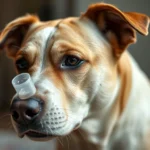
Introduction
Kennel cough, scientifically known as canine infectious tracheobronchitis, is a highly contagious respiratory disease in dogs. It is primarily caused by the bacterium Bordetella bronchiseptica and can also involve several viral infections, including canine parainfluenza virus and adenovirus. The disease is characterized by a persistent, dry cough that may sound like a honk, along with other symptoms like sneezing, lethargy, and in some cases, nasal discharge and fever.
Understanding the contagious nature of kennel cough is essential for pet owners, especially those who frequently visit dog parks, kennels, or grooming facilities. The implications of this disease extend beyond individual dog health; it can affect entire communities of pets. This article aims to provide clear answers from veterinary experts regarding kennel cough, specifically focusing on how long it remains contagious and what pet owners can do to protect their furry friends.
Overview of Kennel Cough
What Causes Kennel Cough?
Infectious Agents
Kennel cough is primarily caused by a combination of bacterial and viral pathogens. The most common infectious agent is Bordetella bronchiseptica, a bacterium that can exist in conjunction with other viruses. Other contributing pathogens include:
- Canine parainfluenza virus
- Canine adenovirus type 2
- Canine respiratory syncytial virus
These pathogens can weaken a dog’s immune system, making them more susceptible to secondary infections. The presence of multiple infectious agents is often why kennel cough can spread so rapidly in high-density environments.
Symptoms of Kennel Cough
Primary Symptoms
The most notable symptom of kennel cough is a dry, honking cough. This cough can be triggered by exercise or excitement and may persist for several weeks. Other symptoms can include:
- Sneezing
- Nasal discharge
- Lethargy
- Mild fever
While kennel cough is typically not life-threatening, it can lead to more severe respiratory issues, especially in young puppies, elderly dogs, or those with existing health problems.
Diagnosis by a Veterinarian
Veterinary Examination
A proper diagnosis of kennel cough usually involves a thorough clinical evaluation by a veterinarian. They will assess the dog’s medical history and perform a physical examination, focusing on the respiratory system. In some cases, additional diagnostic tests such as X-rays or cultures may be necessary to rule out other conditions or to identify the specific pathogens involved.
Contagious Nature of Kennel Cough
How is Kennel Cough Spread?
Transmission Methods
Kennel cough is highly contagious and can spread through various means:
- Airborne Particles: When an infected dog coughs or sneezes, tiny droplets containing the pathogens can linger in the air and be inhaled by other dogs.
- Direct Contact: Dogs can contract kennel cough through direct interaction, such as playing or sniffing each other.
- Contaminated Surfaces: The bacteria can survive on surfaces like kennel floors, grooming tools, and even food bowls, allowing for indirect transmission.
High-Risk Environments
Certain environments pose a higher risk for the spread of kennel cough, including dog parks, kennels, daycares, and grooming salons. In these settings, dogs are often in close proximity to one another, facilitating the transmission of infectious agents.
Duration of Contagion
How Long is Kennel Cough Contagious?
The consensus among veterinarians is that kennel cough can remain contagious for 1 to 3 weeks after the onset of symptoms. During this time, an infected dog can transmit the disease to others, even if they are showing only mild symptoms. The specific duration may vary depending on the individual dog’s health and the pathogens involved.
Factors Affecting Contagion Period
Individual Health Factors
Several factors can influence how long a dog remains contagious:
- Age: Younger puppies and older dogs often have weaker immune systems, potentially extending the duration of contagion.
- Vaccination Status: Dogs that are up-to-date on their vaccinations may experience milder symptoms and shorter periods of contagion.
- Overall Health: Dogs with pre-existing health conditions may take longer to recover and remain contagious.
Environmental Factors
The environment also plays a critical role in the spread of kennel cough. High-density areas with poor ventilation can facilitate the spread of the disease, while cleaner, less crowded areas may reduce transmission risks.
Prevention Strategies
Vaccination
Importance of Vaccination
Vaccination is one of the most effective ways to prevent kennel cough. Several vaccines are available that target the most common pathogens involved in the disease, including Bordetella bronchiseptica.
- Timing and Frequency: It’s recommended that dogs be vaccinated annually, especially if they frequent high-risk environments. Puppies should receive their first Bordetella vaccine at around 6-8 weeks of age, with boosters given as needed.
Hygiene Practices
Maintaining Clean Environments
Pet owners can help prevent the spread of kennel cough by maintaining hygiene in environments where dogs congregate. Essential practices include:
- Regular Cleaning: Regularly clean and disinfect kennels, grooming tools, and any shared items like toys and bowls.
- Avoiding Shared Items: Minimize the sharing of items among dogs, as pathogens can survive on surfaces for extended periods.
Monitoring Dog Health
Regular Check-ups
Routine veterinary check-ups are crucial for ensuring your dog’s health and catching any potential issues early. Pet owners should be vigilant in monitoring their dog’s health and recognizing symptoms of kennel cough, such as coughing or lethargy.
Treatment Options
Home Care for Mild Cases
At-home Remedies
For mild cases of kennel cough, home care can be effective. Recommendations include:
- Hydration: Ensure your dog stays well-hydrated; water helps soothe the throat and supports recovery.
- Humidifiers: Using a humidifier can help ease respiratory discomfort.
- Rest: Allow your dog plenty of rest to support their immune system.
When to Seek Veterinary Help
If symptoms persist for more than a week or worsen, it’s vital to consult a veterinarian. Signs that require immediate attention include persistent coughing, difficulty breathing, or a high fever.
Veterinary Treatment Options
Medications
If kennel cough is diagnosed, a veterinarian may prescribe medications, which can include:
- Cough Suppressants: These can help manage the cough, making the dog more comfortable.
- Antibiotics: If a secondary bacterial infection is suspected, antibiotics may be prescribed.
Follow-up Care
Follow-up visits are essential to ensure the treatment is effective and to monitor for any complications. Regular check-ins with your vet can help ensure your dog recovers fully.
Frequently Asked Questions
Can Dogs Get Kennel Cough More Than Once?
Re-infection Risks
Yes, dogs can get kennel cough more than once. The disease is caused by various pathogens, and immunity to one strain does not guarantee immunity to others. This means a dog could become infected with a different strain of Bordetella or another pathogen responsible for kennel cough.
What to Do If My Dog is Exposed?
Immediate Actions
If your dog has been exposed to another dog with kennel cough, monitor them closely for symptoms. It’s advisable to contact your veterinarian for guidance, particularly if your dog is unvaccinated or exhibits any signs of illness.
Can Other Pets Get Kennel Cough?
Species Affected
While kennel cough primarily affects dogs, other species, including cats, can be susceptible to certain components of the disease. It’s less common, but pet owners should be cautious and consult their veterinarian if they have concerns about other pets in the household.
Conclusion
In summary, understanding the contagious nature of kennel cough is vital for every pet owner. The disease can last for 1 to 3 weeks after symptoms appear, making it essential to recognize the signs early and implement effective prevention strategies, including vaccination and hygiene practices.
Pet owners should remain informed and proactive about their dog’s health. Regular veterinary consultations can provide invaluable insight into maintaining your dog’s well-being and ensuring they are protected against kennel cough and other contagious diseases. Your veterinarian is your best ally in keeping your furry friends healthy and happy.









